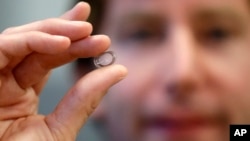Swiss drugmaker Novartis has struck an agreement with Google to develop “smart” contact lenses that would help diabetics to track their blood glucose levels or restore the eye's ability to focus.
The device for diabetics would measure glucose in tear fluid and send the data wirelessly to a mobile device, Novartis said. The technology is potentially life-changing for many diabetics, who prick their fingers as many as 10 times daily to check their body's production of the sugar.
Success would allow Novartis to compete in a global blood-sugar tracking market that is expected to be worth more than $12 billion by 2017, according to research firm GlobalData. Diabetes afflicts an estimated 382 million people worldwide.
Many people with Type 1 diabetes and some with Type 2 diabetes monitor their blood glucose level to help to manage their condition and reduce the risk of health complications such as amputation and blindness.
Simon O'Neill, director of health intelligence at the charity Diabetes UK, said the field would “welcome any investment in new technology that might one day have the potential to make this easier for people or to offer them more choice”.
He added, however, that without knowing more about this technology “we have no idea how likely it is to develop into something that is routinely available or how long this might take to happen”.
The second element of the Google agreement is centered on presbyopia, in which aging eyes have trouble focusing on close objects. Novartis hopes the lens technology will help to restore the eye's ability to focus, almost like the autofocus on a camera.
Embedded technology
Non-invasive sensors, microchips and other miniaturized electronics would be embedded into the contact lenses.
Under the deal, Novartis's Alcon eyecare unit will further develop and commercialize the lens technologies designed by Google, the American company's development team.
Financial details were not disclosed.
The alliance comes as drugmakers explore ways for technology to reshape healthcare, helping patients to monitor their own health and lowering the costs of managing chronic diseases.
In turn, technology companies such as Apple, Samsung Electronics and Google are trying to find health-related applications for wearable devices.
Novartis Chief Executive Joe Jimenez said he hoped that a product could be on the market in about five years.
“This really brings high-technology and combines it with biology - and that's a very exciting combination for us,” Jimenez told Reuters.
“I think you're going to see more and more areas of unmet medical need where companies like Novartis are going to take a non-traditional approach to addressing those needs.”
Although the licensing deal is only for the eye, Jimenez said the drugmaker was also thinking about how technology could be applied in other areas, such as remote patient monitoring in heart failure.









